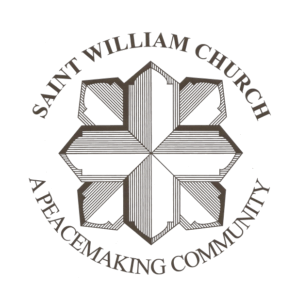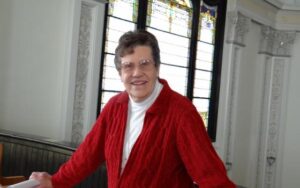Organizing, Prophetic Communities, and the Diaconate

Our friend Elizabeth Young in Australia had a chance to interview Sr. Nathalie Becquart while she was in Australia as part of the Oceania continental assembly. Check out the full interview here. I’ve reprinted an excerpt here that inspired this week’s reflection!
Elizabeth: Through this synodal process, how do you see the promotion and expansion of the permanent diaconate?
Sr. Nathalie Becquart: […]
We can’t think of one ministry in itself, but we are thinking of the broad view. We can see in many countries that women are serving the diaconate of the Church; this was especially raised in the Synod of the Amazon. We need to be creative. Historians know that there have been women deacons in history. Some Orthodox churches have reinstated them, such as the Armenian Apostolic Church. We need to take things into account and discern.
What I see is that there is not yet a complete and precise theology of the diaconate. According to where they are, permanent deacons are doing different things. They are supposed to be for those on the margins, but sometimes they are only doing parish work. This Synod is discerning how to be Church for today and tomorrow, including all kinds of ministries.
What is the deacon supposed to be in the life of a synodal Church? While at the recent “Prophetic Communities conference” I started to see it. Not only in theory, but in practice.
A group of more than 10 Latina women leaders from COPA, a community organizing project in Monterey CA, were present, representing parishes across the Monterey Diocese. They had been instrumental in helping to lead the local consultation for the synod with their Bishop. They brought decades of experience in the art of listening to what is on the hearts and minds of their people in order to build an agenda for social justice from the ground up. The synod gave them an opportunity to bring this training and experience to bear for the good of the Church that they love so dearly.
One leader, Sally Torres, described how thrilling it was to have ALL of the ministries of her parish involved in their synod listening consultations. People were so energized to be listened to!
In his recorded address, Bishop John C. Wester of Santa Fe spoke about how he relies on local community organizers and organizations to help him discern a path to act in the face of injustice.
Here then is one view of diaconal ministry in a synodal church:
Listening deeply to the hearts and minds of the people. Sharing what is seen and heard with one’s bishop. Participating in the slow civic engagement building work of discerning consensus with those across our diverse, complex, and often polarized communities.
This is what community organizers have been doing for 50 years in this country. The Catholic Campaign for Human Development has been an anchor in the work: a backbone for the Church to live principles of subsidiarity, the option for the poor, dignity for workers, and solidarity.
What would it mean for the church to recognize organizing as a vocation? As a holy work, a sacred calling from God, from the community – to serve both as we seek the common good.
Just as we need priests, to remind us all of the universal priesthood, so we need organizers to invite us all to participate in organizing as a public expression of faith.
Sally shared how her 20+ years in organizing work had been a source of such joy, even as they still face tremendous struggles in the community. She also lamented that the parish is dwindling and wonders how the next generation will be sustained without a faith to lean on.
This is where we confront that organizing is not a fix all. My encounter with Sally emphasized the need for the Ministry of the Word – another charism of the deacon. We need deacons who share the good news in a fresh key so that those who are estranged might know the God to which they already belong, and a Church whose space is wider than they were taught to believe.
Discerning Deacons led the evening prayer service at the conference. I was humbled to preach on Acts 5:12-16 – where we are inside the story of the early apostolic community, who are working signs and wonders, “all together” in Solomon’s portico. The Greek word used here is a powerful one: offering depth and mystery for us on a synodal journey.
Homothymadon (Hom-oth-oo-mad-on’)
“A unique Greek word, used 10 of its 12 New Testament occurrences in the Book of Acts, helps us understand the uniqueness of the Christian community. Homothumadon is a compound of two words meaning to “rush along” and “in unison”. The image is almost musical; a number of notes are sounded which, while different, harmonize in pitch and tone. As the instruments of a great concert under the direction of a concert master, so the Holy Spirit blends together the lives of members of Christ’s church” (from the Outline for Biblical Usage, Blue Letter Bible).
To rush along, in unison! To me this reads like the theology of a synodal deacon, formed in Catholic social teaching and in the practice of organizing for consensus.
We do well to turn to the community organizers in our own backyard who can help to show us how we can walk the walk, so to speak, of loving our neighbor and making justice our aim (Isaiah 1). And to the organizers still reading – we can be refreshed, encouraged by synodality. It is a reminder of the promise that the Holy Spirit is the protagonist who draws us into communion…we need not be the architects of justice, just the hands and feet of the Risen One who promises not to leave us orphans.
Sr. Nathalie is right – we must be creative. We do not need more altar servers. We do need ministers whose love of the liturgy, reverence for the mystery we celebrate there, humility at the task of being Ministers of the Word are all at the service of love of the People of God. And this love of God’s people must always drive us into the streets as we walk together –homothymadon– as a community of witness to God’s love, healing, and belonging.
In peace,


